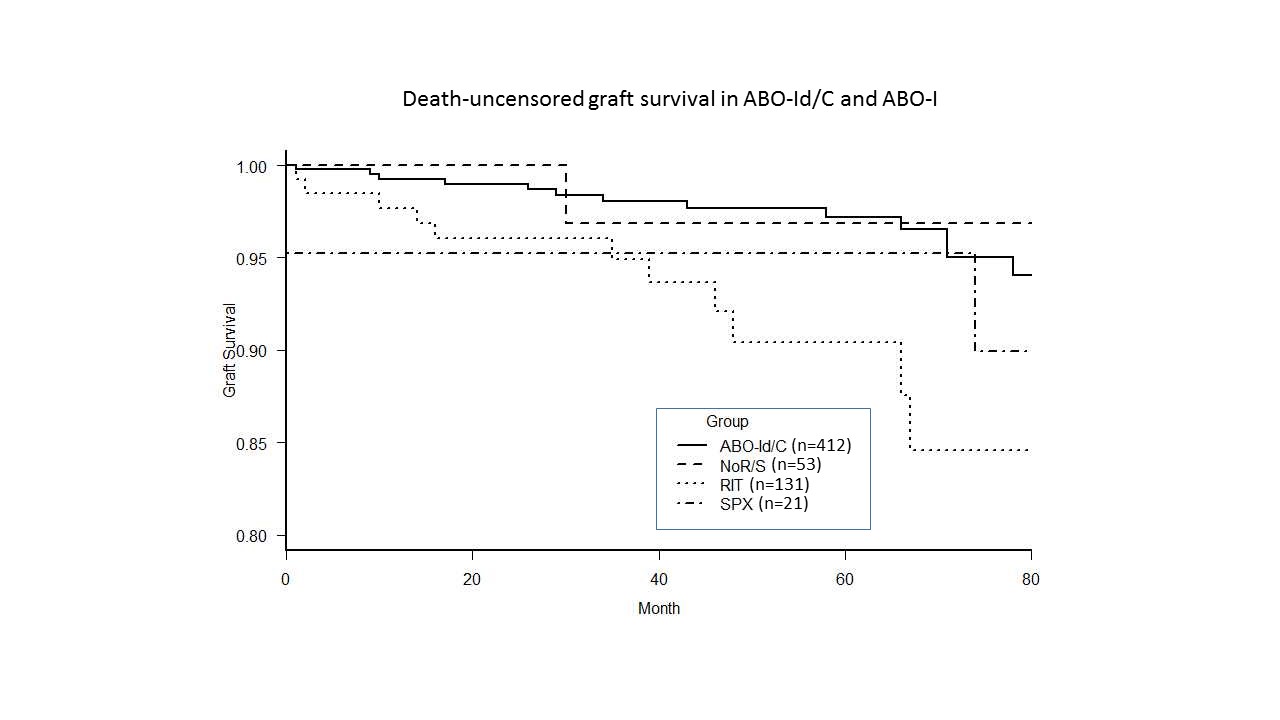Avoidance or Reduction of Rituximab Might Improve Clinical Outcomes in ABO-Incompatible Renal Transplantation: Advantages and Disadvantages of Rituximab.
1Transplant and Endocrine Surgery, Nagoya Daini Red Cross Hospital, Nagoya, Japan
2Renal Transplant Surgery, Aichi Medical University, Nagakute, Japan
3Clinical Research Center, Aichi Medical University, Nagakute, Japan
Meeting: 2017 American Transplant Congress
Abstract number: A57
Keywords: Immunosuppression, Kidney transplantation
Session Information
Session Name: Poster Session A: Clinical Science: Kidney Immunosuppression: Desensitization
Session Type: Poster Session
Date: Saturday, April 29, 2017
Session Time: 5:30pm-7:30pm
 Presentation Time: 5:30pm-7:30pm
Presentation Time: 5:30pm-7:30pm
Location: Hall D1
BACKGROUND
Pretransplant desensitization with rituximab has contributed to drastic improvements in ABO-incompatible renal transplantation (ABO-I). However, ABO-I outcomes are still worse than those of ABO-identical or ABO-compatible renal transplantation (ABO-Id/C).
METHODS
We retrospectively examined the outcomes and complications in consecutive living donor ABO-Id/C (n = 412) and ABO-I (n = 205) cases to elucidate the causes of inferiority in ABO-I. ABO-I cases included recipients treated with rituximab (RIT, n = 131), splenectomy (SPX, n = 21), or neither because of low anti-A/B antibody titers (NoR/S, n = 53). Graft survival, infection, and de novo HLA antibody production were compared for ABO-I and ABO-Id/C, followed by stratification into RIT and NoR/S groups. Propensity score-based methods were employed to limit selection bias and potential confounders.
RESULTS
Overall graft survival for ABO-I was significantly lower than that for ABO-Id/C (92.8% vs 97.2% after five years, P = 0.0037).  Graft loss due to infection with ABO-I was significantly more frequent than that with ABO-Id/C, whereas acute antibody-mediated rejection caused no graft failure in ABO-I recipients. Stratified analysis demonstrated that infection risk was significantly higher with RIT than with NoR/S.
Graft loss due to infection with ABO-I was significantly more frequent than that with ABO-Id/C, whereas acute antibody-mediated rejection caused no graft failure in ABO-I recipients. Stratified analysis demonstrated that infection risk was significantly higher with RIT than with NoR/S.
CONCLUSION
Safe introduction and expansion of rituximab-avoidance pretreatment protocols might contribute to further improvement of ABO-I outcome.
CITATION INFORMATION: Okada M, Watarai Y, Iwasaki K, Murotani K, Hiramitsu T, Tsujita M, Goto N, Narumi S, Kobayashi T. Avoidance or Reduction of Rituximab Might Improve Clinical Outcomes in ABO-Incompatible Renal Transplantation: Advantages and Disadvantages of Rituximab. Am J Transplant. 2017;17 (suppl 3).
To cite this abstract in AMA style:
Okada M, Watarai Y, Iwasaki K, Murotani K, Hiramitsu T, Tsujita M, Goto N, Narumi S, Kobayashi T. Avoidance or Reduction of Rituximab Might Improve Clinical Outcomes in ABO-Incompatible Renal Transplantation: Advantages and Disadvantages of Rituximab. [abstract]. Am J Transplant. 2017; 17 (suppl 3). https://atcmeetingabstracts.com/abstract/avoidance-or-reduction-of-rituximab-might-improve-clinical-outcomes-in-abo-incompatible-renal-transplantation-advantages-and-disadvantages-of-rituximab/. Accessed February 27, 2026.« Back to 2017 American Transplant Congress
